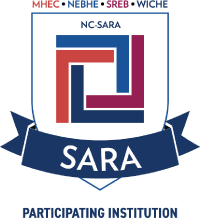Regis College is a leading Catholic university in Greater Boston that has been preparing students for success in an evolving, global world since 1927. Regis offers several online degrees including a distinguished suite of nursing, social work, public health, applied behavior analysis, health administration and business programs. Our renowned faculty provides a values-based education integrated with cutting-edge technology and an industry-focused curriculum.
Our mission to educate the whole person and prepare our students to pursue excellence is more than words or ambitions, it is how we work and live together seeking common outcomes for a better world. We educate adults to provide better support to their communities—or new communities—with the intelligence, skills and compassion to create positive change.

Regis College is accredited by the New England Commission of Higher Education

Founded in 1927 by the Congregation of
Sisters of St. Joseph Boston

Among The Princeton Review’s
“Best Regional Colleges”

Ranked among the Top 25 Fastest-Growing Colleges by The Business Journals

Regis College participates in the State Authorization Reciprocity Agreements.
Online Degree Programs
Regis is proud to offer market relevant, industry leading online degrees covering more than a dozen topics. Please select from the degree paths below to learn more about the programs offered and how we can help you realize the future you want.
Other Online Programs
This program allows students to gain the skills and qualifications needed to advance in the field of medical imaging. It is designed for registered and registry-eligible technologists in all medical imaging areas. Graduates of this program will earn a Bachelor of Science in General Medical Imaging. This 100% online program can be completed at your own pace.
Learn More
Partner Tuition Discounts
We work closely with our partners to tailor our programs to the needs of working professionals.
Click below to see if your company or professional organization makes you eligible for a 10% – 15% tuition discount.
Learn More
“In recent years, Regis has become a powerhouse in professional and graduate education in nursing and health sciences. As a result, our university has become increasingly visible locally, nationally, and internationally.”
Dr. Antoinette Hays RN, Ph.D.
President
Our core values of the college really resonate and merge nicely with our program core values of service to our community as public health servants. The program is service-oriented, the faculty are service-oriented, and my personal background has been service-oriented and working in public health is just a great fit.
Frazier B. Beatty
PhD, MPH, CHESProgram Director, Online Master of Public Health
We know every student by name. We could mention a student’s name and all the faculty are going to know who that is. We probably all know a little something about the student because we actually spend time getting to know our students. And so I think it’s really unique that we have this community.
Donette C. Considine
PhD, LCSWProgram Director, Online Master of Social Work
Our mission includes taking care of you as a whole person, educating you as a whole person. Not just your part as a health care professional but making sure that you understand taking care of your dear neighbor, making sure that you’re taking care of your community and those that are less fortunate than you.
Michele Pedulla
DNP, APRN, CPNP-PCAssistant Dean, Online Graduate Nursing
At the Sloane School of Business & Communication, we are dedicated to training the next generation of leaders in business and the non-profit world by teaching them to be continuous learners and agile professionals. We use real-world partnerships to provide real-world training; we draw upon our extensive private-sector experience to walk students through the workplace challenges they will face tomorrow, not yesterday.
William Koehler, Ph.D
Dean, Sloane School of Business and Communication, Professor of Management



